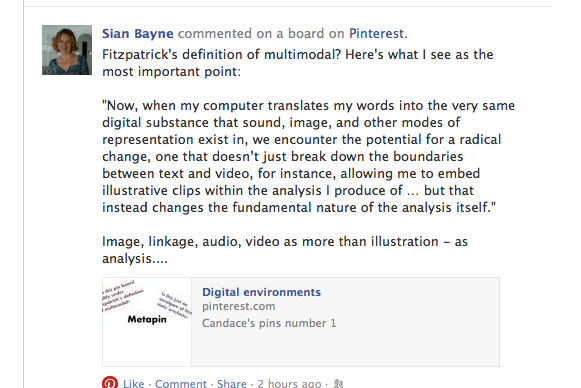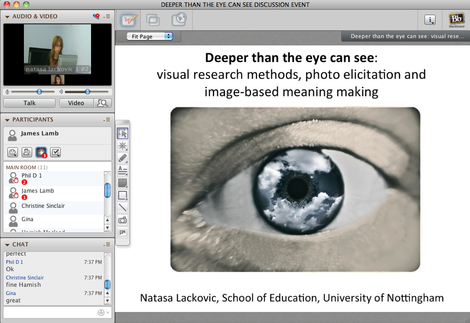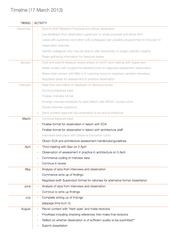|
Following a pleasant weekend in Berlin, I returned to some positive news yesterday evening. Sian has responded positively to my proposed research and has made some useful suggestions for the next step forward:
I'll move on these actions right away, including responding to set up a meeting to get things underway. Good news for the time being, however.
0 Comments
Just noticed this from Sian on Facebook. No time to reflect on it just now so will bookmark it in the form of a screenshot:
This evening I attended an interesting and useful session by Natasa Lackovic on the subject of visual research methodologies. Natasa had prepared a video presentation in advance of the session that I watched earlier today (and for which I have a few pages of hand written notes). Here's the link to the video: And here are some of my notes from this evening's session (with a full transcript at the bottom).
As of Sunday past, my dissertation proposal and ethics form have been submitted. Sian is going to get back to me later this week with initial feedback and then to set up a supervisory meeting. Here are the documents:
The following information snet through from Jen Ross ahead of Natasa Lackovic's session on visual literacy next Tuesday. The video doesn't play (something to do with Windows Media Player, apparently) so I'll need to try go in early to work and try and catch it before Tuesday.
Another potentially valuable paper from EDC 10. Direct citation indented, followed by my comments in turn.
Comment:
Comment:
Comment:
Comment:
Comment:
Comment:
Not too much to draw from this secondary reading from the EDC10 course. Perhaps a few useful points to confirm ideas in other articles.
Useful stuff on transliteracy (and some mentions of multimodality) in this reading from the EDC10 course:
Comment:
Comment:
Comment:
Comment:
Comment:
Comment:
Comment:
Comment:
Comment:
Clara suggested inviting interview participants to bring a piece of multimodal assessment to the interview. I wonder instead whether I should present the participants with a piece of multimodal assessment and use it as a source of discussion? I quite like this idea.
Once again, from one of my EDC10 binders of readings. Cited text from the paper indented, followed by my comments in each case.
Comment:
Comment:
Comment:
Comment:
Comment:
Comment:
Comment:
Comment:
|
Categories
All
Archives
October 2013
TimelineOther stuff
|
||||||||||||||||||||||||||||||||||||||||||||||||||||||||||||||||||||||||||||||||||||


